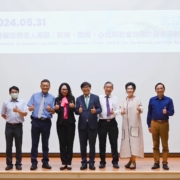【Media Report】Conference on “Depression and Elderly Care: Integration of Policy, Medical Care, Psychological and Social Support” organized by the Center for Health and Welfare Policy Research, Taipei Medical University
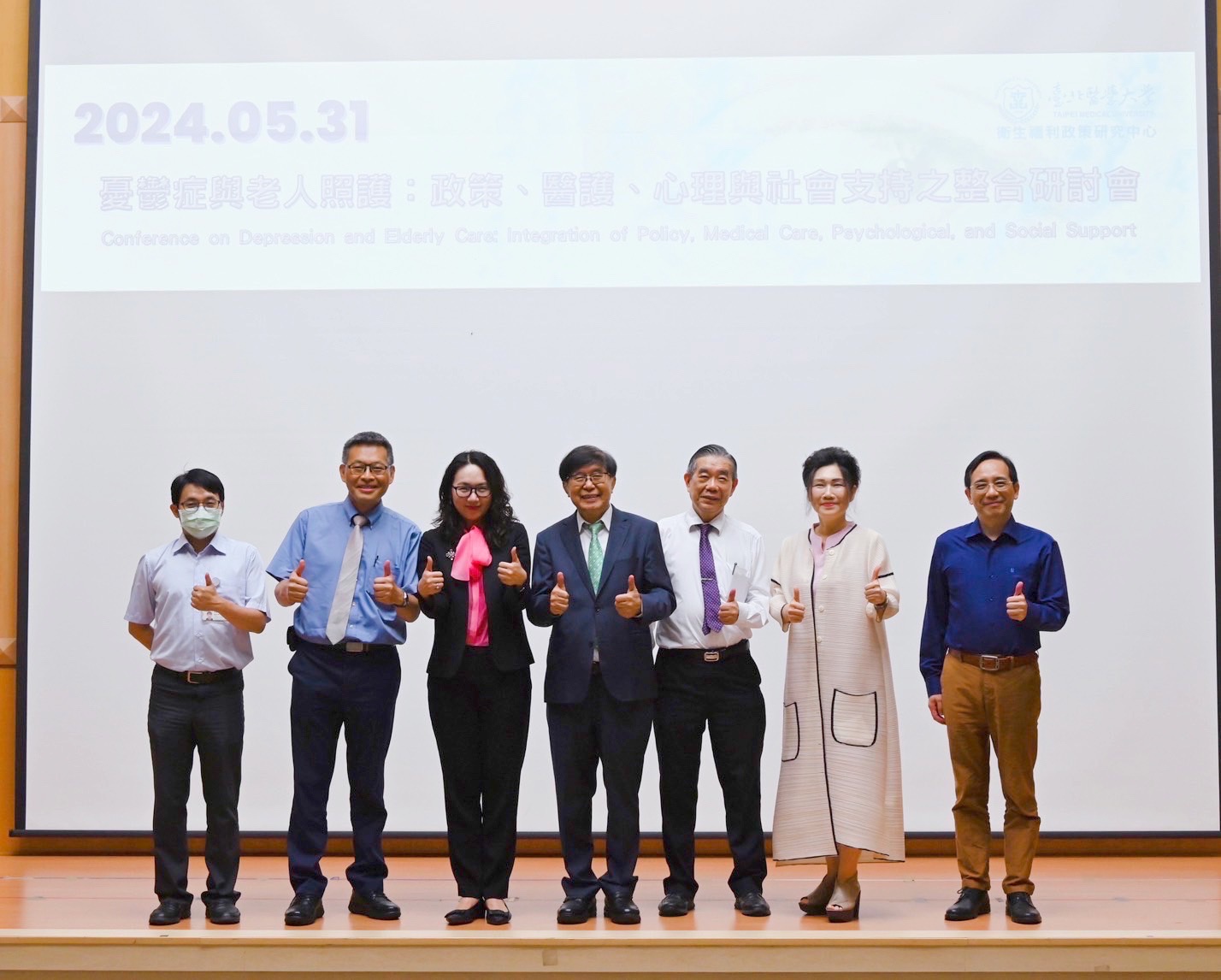
Pictured from left to right: Professor Yang Cheng-Chang, Professor Tsai Shang-Ying, Director Chen Lian-Yu, Director Lee Po-Chang, Executive Director Lee Long-Teng, Distinguished Professor Chou Kuei-Ru, Deputy Director Lee Chung-Hsi
On May 31, 2024, the Center for Health and Welfare Policy Research at Taipei Medical University held a conference titled “Depression and Elderly Care: Integration of Policy, Medical Care, Psychological and Social Support,” focusing on mental health care for the elderly. This conference covered medical and public health fields and invited various scholars and experts, including Director of the Mental Health Division of the Ministry of Health and Welfare Chen Lian-Yu, Distinguished Professor of the College of Nursing at Taipei Medical University Chou Kuei-Ru, Professor of Psychiatry at Taipei Medical University and Director of the Psychiatry Research Center at Taipei Medical University Hospital Tsai Shang-Ying, Assistant Professor of the PhD Program in Global Health and Health Policy at Taipei Medical University Yang Cheng-Chang, and Executive Director of the Taiwan Depression Prevention Association Lee Long-Teng.
Director Lee Po-Chang Advocates for the Importance of Psychological Care
Director of the Center for Health and Welfare Policy Research at Taipei Medical University, Lee Po-Chang, highlighted in his welcome speech that society still holds prejudices against depression, and many mild patients mistake it for mere moodiness and neglect medical treatment. He emphasized that physical and mental health are closely related; some people become depressed due to chronic or severe diseases, while others develop physical and mental discomfort due to depression. If family or friends show abnormal emotions or behaviors, such as frequent sighing, loss of interest in activities, or staying home for extended periods, vigilance is necessary, and medical help should be sought. Lee also shared his experience as a volunteer at the Zhang Teacher Helpline during his university years, understanding the importance and professional value of psychological therapy. He called on society to focus on and support solving mental health issues, as psychological therapy and care are crucial for patients’ recovery.
Director Chen Lian-Yu Explains Policies and Challenges for Elderly Mental Health
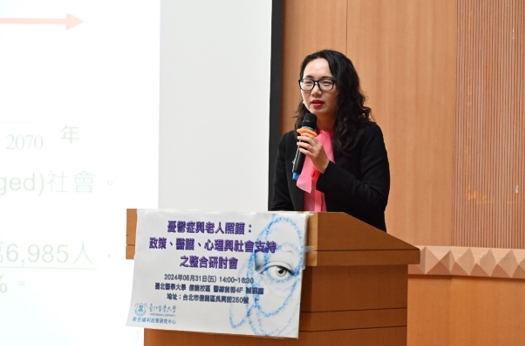
Director of the Mental Health Division of the Ministry of Health and Welfare, Chen Lian-Yu, noted that Taiwan is rapidly becoming a super-aged society, bringing significant challenges to elderly care. Given the rising number of elderly patients with depression and the persistently high suicide rate, the government has formulated a three-tier prevention strategy for elderly mental health.
Three Aspects of Elderly Mental Health Policy:
- Comprehensive Strategy**: Establish the “Joyful Mind – Mental Health Learning Platform” to promote mental health through advocacy, exhibitions, and educational activities, enhancing public awareness and attention.
- Selective Strategy: Promote depression screening and referral services for high-risk groups, ensuring early detection and treatment to reduce the impact of depression on the elderly.
- Indicative Strategy: Provide and strengthen professional mental health services for patients and caregivers, creating a supportive community environment to ensure the elderly have autonomy and a sense of participation in society.
The government emphasizes the concept of healthy aging, drawing on the successful aging experience of the United States, striving to reduce unhealthy life expectancy and enhance physical health, mental health, and social participation to achieve well-being. The prevalence of depression among the elderly is as high as 16.7%, but it is often overlooked due to being mistaken for normal aging, stigma, and similarities with dementia symptoms. Untreated depression can develop into dementia.
The Ministry of Health and Welfare has set up screening and referral resources, screening over 650,000 people last year. Future efforts will include large-scale surveys, interdisciplinary cooperation, and technology applications to ensure the elderly receive the attention and support they need for mental health.
Professor Chou Kuei-Ru Discusses the Link Between Mental Health and Long-Term Care
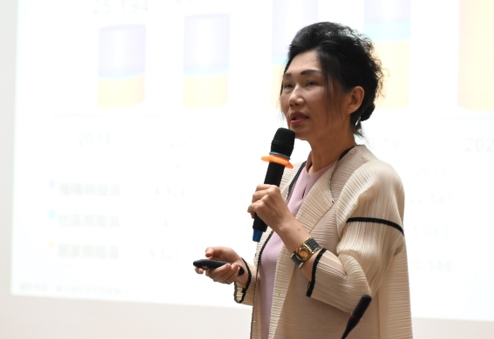
Distinguished Professor Chou Kuei-Ru of the College of Nursing at Taipei Medical University pointed out that with the rapid aging of the population, the demand for long-term care services among the elderly will grow exponentially. The high prevalence of elderly mental illness will pose significant challenges to the existing long-term care system. Professor Chou emphasized that the current long-term care system is overly reliant on traditional medical models, lacking adequate attention and response measures for elderly mental health issues, and failing to provide integrated and continuous care.
Professor Chou called for policy reforms to develop diversified home-based long-term care services, integrate community medical resources, and strengthen screening and referral services. Although long-term care personnel have increased yearly, there are still uneven distribution issues, with some units unable to provide corresponding services. She stressed the need to establish a comprehensive care model centered on elderly patients, integrating mental health services into the long-term care system to improve the quality of life for the elderly and reduce the care burden on families and society.
Professor Tsai Shang-Ying Analyzes Elderly Depression: Diagnosis, Non-Pharmacological Treatment, and Prevention
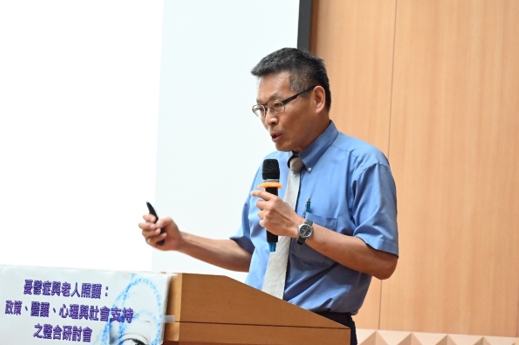
Professor of Psychiatry at Taipei Medical University and Director of the Psychiatry Research Center at Taipei Medical University Hospital, Tsai Shang-Ying, emphasized the importance of accurately distinguishing between early dementia and depression to avoid medical ethics issues and labeling effects caused by over-diagnosis. He pointed out that while the DSM-5 diagnostic criteria provide references, the impact of patients’ physical functions should be considered.
Professor Tsai emphasized the importance of non-pharmacological treatments, especially for the elderly, adopting a subtraction rather than addition medication strategy. He suggested removing modifiable risk factors such as loneliness and lack of emotional support while enhancing protective factors like expanding social networks and cultivating hobbies. He recommended promoting and increasing healthy behaviors, such as maintaining adequate sleep, a reasonable diet, and moderate activity, and emphasized regular daily activity times.
Professor Yang Cheng-Chang on the Role of Clinical Psychology in Long-Term Care and Community Elderly Mental Health
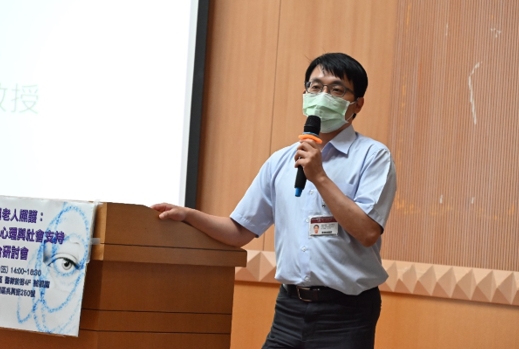
Assistant Professor of the PhD Program in Global Health and Health Policy at Taipei Medical University, Yang Cheng-Chang, noted that during the COVID-19 pandemic, the suicide rate among the elderly in Taiwan significantly increased due to reduced social support services, disrupted routine medical services, and lack of social interaction. He stressed that the three key elements of successful aging are reducing disease or disability, actively engaging in life, and maintaining physical and mental functions, which are crucial for improving the quality of life for the elderly.
Professor Yang emphasized the role of clinical psychologists in promoting elderly mental health, not only providing psychological disease treatment, supporting caregivers, promoting social interaction, and assisting in chronic disease mental adjustment but also through cognitive function training and self-efficacy enhancement to help the elderly maintain mental health. He called for increased attention and resource investment in elderly mental health, asserting that through the intervention and support of clinical psychologists, the elderly can maintain resilience in adversity and achieve successful aging.
Executive Director Lee Long-Teng Discusses the Detection of Elderly Depression
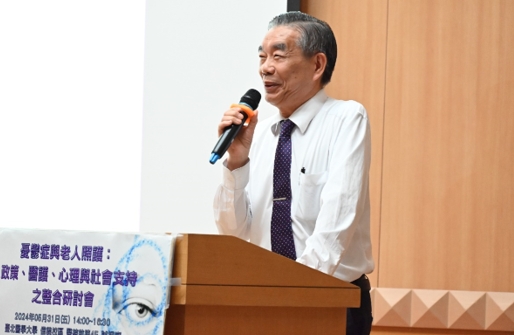
Executive Director of the Taiwan Depression Prevention Association, Lee Long-Teng, pointed out that with the aging of society, elderly depression has become a major medical and public health challenge. Depression is not just about feeling bad; it is a disease that affects daily life, work, social interaction, and physical health. In Taiwan, one in twelve elderly people over 65 years old suffers from major depression. Elderly depression is often misrecognized as normal aging or masked by symptoms of physical diseases, making early detection and treatment more difficult.
Executive Director Lee detailed the various types of elderly depression, emphasizing that each type has its unique manifestations and treatment needs. In recent years, the Ministry of Health and Welfare has promoted several prevention measures, including advocacy and education, setting up helplines, screening and referral treatment, and subsidizing counties and cities to establish community mental health centers to provide professional consultations. Using tools like the GDS-15 scale can detect high-risk groups early and provide appropriate treatment, reducing the severity of depression and suicide risk. He urged the public to actively care for and assist elderly relatives and friends with relevant symptoms, asserting that effective depression prevention and ensuring the psychological health of the elderly require joint societal efforts.
Conference General Recommendations
During the conference, experts and scholars made several specific recommendations and conclusions on elderly mental health issues, aiming to improve the quality of life and psychological health of the elderly. The following are the general recommendations and conclusions of the conference:
- Enhance Public Awareness: Through advocacy and educational activities, increase public understanding of elderly depression, reduce stigma, and promote early detection and treatment. The public should understand the symptoms and impact of elderly depression and recognize it as a health issue that needs attention and treatment.
- Strengthen Screening and Referral: Use simple scales like the GDS-15 for screening to identify high-risk groups early and provide appropriate referral services. This will help timely intervention, prevent the further deterioration of depression, and ensure the psychological health of the elderly.
- Enhance Community Support: Establish more community mental health centers to provide professional psychological consultation and support, creating a friendly community environment. Community mental health centers should be the first choice for the elderly to seek mental health support, offering diverse mental health services.
- Support Caregivers: Provide psychological support and resources for caregivers to reduce their psychological stress, ensuring the elderly receive good care. Caregivers’ mental health is equally important; necessary support and training should be provided to improve the quality of care.
- Promote Interdisciplinary Collaboration: Through large-scale surveys, research, and technological applications, promote cooperation among medical, social services, and community sectors to jointly address the mental health needs of the elderly. Interdisciplinary collaboration will help form a comprehensive support system to better meet the mental health needs of the elderly.
The conference conducted an in-depth discussion on elderly mental health issues, emphasizing the importance of raising public awareness, strengthening screening and referral, enhancing community support, supporting caregivers, and promoting interdisciplinary collaboration. Through these recommendations, it is hoped to provide more comprehensive mental health services for the elderly, reduce the occurrence and impact of depression, and improve their quality of life and happiness. The whole society should work together to pay attention to and support the mental health needs of the elderly, and through the close cooperation of the government, medical institutions, and the community, establish a sound mental health support system to ensure that the elderly can age healthily and happily.
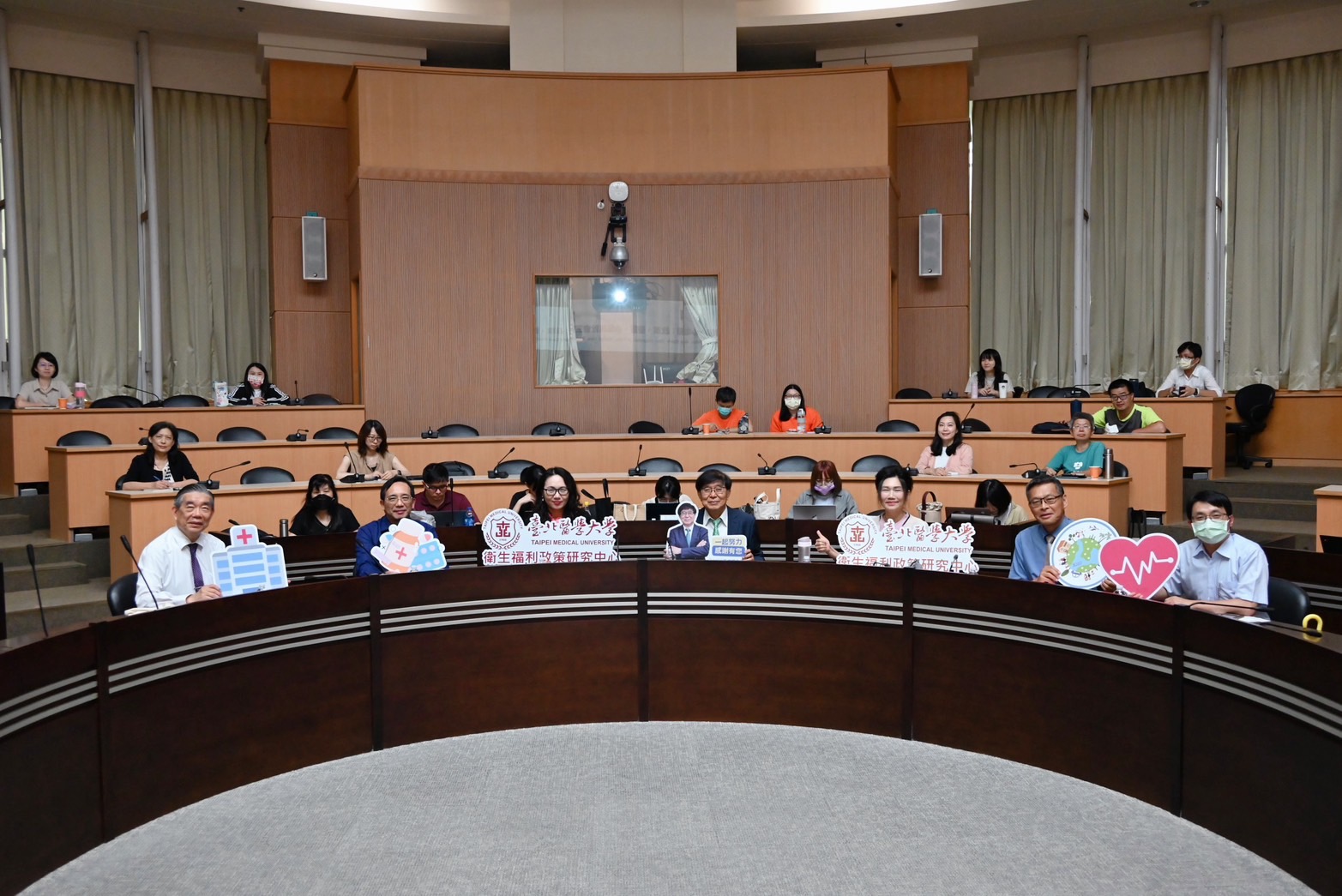
Pictured from left to right: Executive Director Lee Long-Teng, Deputy Director Lee Chung-Hsi, Director Chen Lian-Yu, Director Lee Po-Chang , Distinguished Professor Chou Kuei-Ru, Professor Tsai Shang-Ying, Professor Yang Cheng-Chang
Related Media Reports
2024/05/31 [ETtoday News Cloud] 94-year-old grandma falls 3 times! “Worried about being a burden to family,” doesn’t want to live – 3 reasons why depression in the elderly is hard to diagnose
https://health.ettoday.net/news/2749886
2024/05/31 [ETtoday Health News Cloud] 1 in 6 elderly has depression! “Three main reasons” for suicidal thoughts revealed
https://health.ettoday.net/news/2749829
2024/05/31 [UDN United News] TMU Professor: Depression should be diagnosed without illness, mental care should move towards deinstitutionalization
https://udn.com/news/story/7266/8001754
2024/05/31 [UDN United News] 1 in 6 elderly has depression, Mental Health Division of MOHW: 3 reasons why depression in the elderly is hard to diagnose
https://udn.com/news/story/7266/8001212
2024/05/31 [Liberty Times] 1 in 6 elderly has depression, only 27% receive treatment – not addressing it may increase risk of dementia
https://health.ltn.com.tw/article/breakingnews/4690910
2024/05/31 [Central News Agency] In Taiwan, 1 in 6 people over 65 has depression – mistaken for aging, may be overlooked
https://www.cna.com.tw/news/ahel/202405310340.aspx
2024/05/31 [Merit Times] 1/6 elderly have depression, 3 reasons leading to difficult diagnosis
https://www.merit-times.com/newslistdetail_tw_1.php?id=51831
2024/05/31 [SET News] 90-year-old woman falls 3 times, “worried about burdening family” and becomes suicidal – Doctor: 3 reasons why depression in the elderly is hard to diagnose
https://www.setn.com/News.aspx?NewsID=1477436
2024/06/03 [Economic Daily News] TMU hosts symposium to discuss depression and elderly care issues
https://money.udn.com/money/story/11800/8007695
2024/06/03 [Owlting News] TMU holds symposium on “Integration of Depression and Elderly Care”

